Fossilization vs Stabilization
fossilization的定义
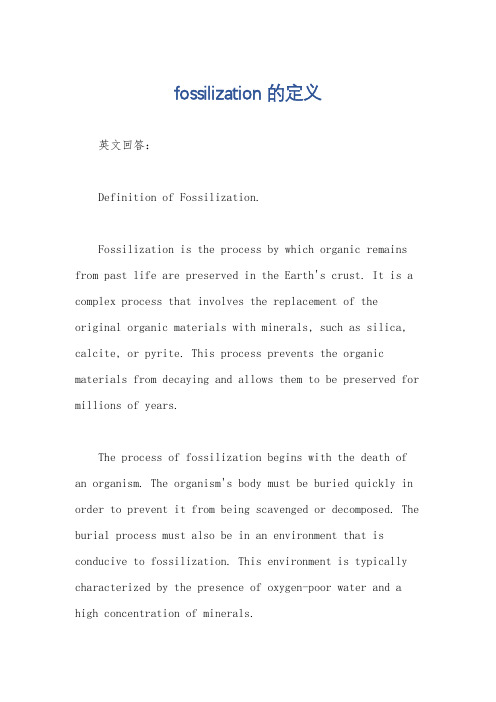
fossilization的定义英文回答:Definition of Fossilization.Fossilization is the process by which organic remains from past life are preserved in the Earth's crust. It is a complex process that involves the replacement of the original organic materials with minerals, such as silica, calcite, or pyrite. This process prevents the organic materials from decaying and allows them to be preserved for millions of years.The process of fossilization begins with the death of an organism. The organism's body must be buried quickly in order to prevent it from being scavenged or decomposed. The burial process must also be in an environment that is conducive to fossilization. This environment is typically characterized by the presence of oxygen-poor water and a high concentration of minerals.Over time, the minerals in the environment will beginto replace the organic materials in the organism's body. This process is called mineralization. The minerals will gradually fill in the spaces that were once occupied by the organism's soft tissues. Over millions of years, the organism's body will be completely replaced by minerals.The end result of the fossilization process is a fossil. Fossils are the remains or traces of animals, plants, and other organisms that have been preserved in the Earth'scrust for millions of years. Fossils provide valuable information about the history of life on Earth. They can be used to reconstruct the appearance and behavior of extinct organisms. They can also be used to study the evolution of life on Earth.中文回答:化石化的定义。
地球化学专业英语词汇

地球化学专业英语词汇摘要:地球化学是一门研究地球及其组成、结构、演化和变化的自然科学。
地球化学专业的学习需要掌握一些基本的英语词汇,以便阅读和理解相关的文献、报告和数据。
本文根据地球化学的主要内容,将英语词汇分为以下几个部分:地球构造、岩石和矿物、地球化学过程、地球化学分析和方法、地球化学应用和专业术语。
每个部分给出了一些常用或重要的英语词汇,并列出了中文和英文的对照。
一、地球构造地球构造是指地球内部的结构和组成,以及它们之间的相互作用。
地球构造是影响地球表面形态和动力学的重要因素,也是地球化学研究的基础。
以下是一些与地球构造相关的英语词汇:中文英文地球Earth地核core内核inner core外核outer core地幔mantle上地幔upper mantle下地幔lower mantle地壳crust大陆地壳continental crust海洋地壳oceanic crust岩石圈lithosphere滑动圈asthenosphere板块plate板块运动plate tectonics板块边界plate boundary构造带tectonic belt构造单元tectonic unit构造环境tectonic setting构造活动tectonic activity二、岩石和矿物岩石和矿物是地球化学研究的主要对象,它们记录了地球历史上发生过的各种物理、化学和生物过程。
岩石是由一个或多个矿物组成的固态聚合体,根据形成方式可以分为火成岩、沉积岩和变质岩。
矿物是具有一定的化学成分和结晶结构的自然形成的无机固体。
以下是一些与岩石和矿物相关的英语词汇:中文英文岩石rock火成岩igneous rock沉积岩sedimentary rock变质岩metamorphic rock岩浆岩magmatic rock火山岩volcanic rock侵入岩intrusive rock喷出岩extrusive rock碎屑岩clastic rock化学沉积岩chemical sedimentary rock生物沉积岩biogenic sedimentary rock原生变质岩protolith metamorphic rock接触变质岩contact metamorphic rock区域变质岩regional metamorphic rock热变质岩thermal metamorphic rock压力变质岩pressure metamorphic rock矿物mineral晶体crystal晶面crystal face晶轴crystal axis晶系crystal system对称元素symmetry element对称性symmetry矿物学mineralogy矿物化学mineral chemistry矿物物理mineral physics矿物光学mineral optics三、地球化学过程地球化学过程是指地球内外发生的各种化学反应和物质迁移,它们造成了地球各部分的化学组成和同位素比例的差异和变化。
语言学和语言教学
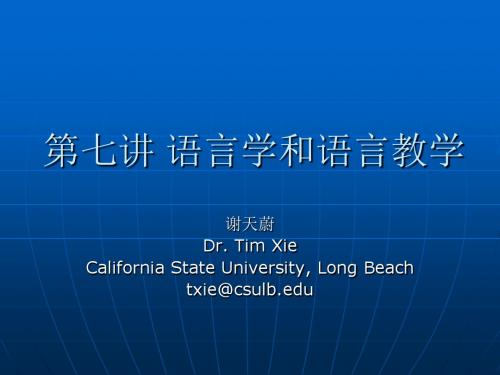
认知法 cognitive method
六十年代美国著名心理学家卡鲁尔首先提 出 用认知-符号学习理论代替听说法的刺激 --反应学习理论。 反对语言是“结构模式”的理论,反对在 教学中进行反复的机械操作练习。 主张语言是受规则支配的创造性活动语言 的习惯是掌握规则,而不是形成习惯,提 倡用演绎法讲授语法。
视听法 (audio-lingual)
视听法于五十年代首创于法国,由古布里纳提出, 主张广泛利用幻 灯、电影等电化教学设备组织听 说操练,把听觉形象和视觉形象结合起来。视听 法主张听说训练必须同一定情景结合,在某一情 景基础上进行,因此,叫作情景法(situational method)。在教学中广泛使用声、光电的现代化教 学技术设备,使语言与形象紧密结合,在情景中 整体感知外语的声音和结构。有助于养成正确的 语音、语调、节奏及遣词、造句的能力和习惯。 视听法的缺点是过于重视语言形式,忽视交际能 力的培养,过分强调整体结构,忽视语言分析、 讲解和训练。
3 系统形成阶段(systematic stage) 这一阶段学习者的语言运用表现出更多的 一致性。虽然这时他所内化的目的语的一 些规则不是十分完全,但却是连贯的,是 比较接近目的语的系统的。这一阶段的明 显特征是习得者的错误只要稍稍指出一下, 他便能自行更正。
4 稳定阶段(stabilization stage) 在 这一阶段学习者的错误相对地比较少, 学习者已掌握了目的语系统,语言运用比 较流利,表达意义也没有什么问题。这一 阶段的特征是学习者无需他人指出便能自 己 更正语言运用中的错误。学习者的语言 系统趋于稳定,所犯的错误只不过是由于 疏忽大意或由于忘记了运用某条已知的规 则而造成的。
fossilization
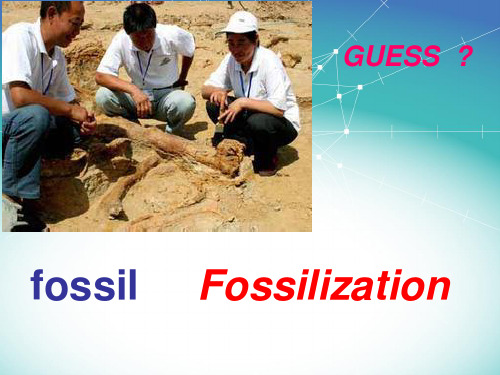
B We had so many works to do that we had to stay at home. C We opened the TV set and began to watch. D I entered the kitchen, trying to find some eating things.
This second position on the nature of fossilization has also been referred to by Sims as soft fossilization
or jellification.
C In terms of language aspects: phonological, lexical, grammatical fossilization
由于中国民族众多,方言复杂,各地的学习者在发 音方面各有特色,石化现象表现得很突出。
[i:] ---- [i] [θ]---- [S] [u:]----[u] [f] ---- [v] [n] ---- [l]
fossilization名词解释
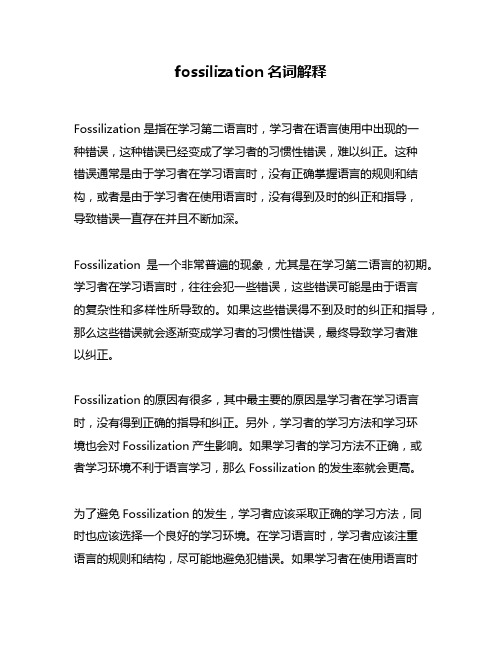
fossilization名词解释Fossilization是指在学习第二语言时,学习者在语言使用中出现的一种错误,这种错误已经变成了学习者的习惯性错误,难以纠正。
这种错误通常是由于学习者在学习语言时,没有正确掌握语言的规则和结构,或者是由于学习者在使用语言时,没有得到及时的纠正和指导,导致错误一直存在并且不断加深。
Fossilization是一个非常普遍的现象,尤其是在学习第二语言的初期。
学习者在学习语言时,往往会犯一些错误,这些错误可能是由于语言的复杂性和多样性所导致的。
如果这些错误得不到及时的纠正和指导,那么这些错误就会逐渐变成学习者的习惯性错误,最终导致学习者难以纠正。
Fossilization的原因有很多,其中最主要的原因是学习者在学习语言时,没有得到正确的指导和纠正。
另外,学习者的学习方法和学习环境也会对Fossilization产生影响。
如果学习者的学习方法不正确,或者学习环境不利于语言学习,那么Fossilization的发生率就会更高。
为了避免Fossilization的发生,学习者应该采取正确的学习方法,同时也应该选择一个良好的学习环境。
在学习语言时,学习者应该注重语言的规则和结构,尽可能地避免犯错误。
如果学习者在使用语言时犯了错误,那么应该及时得到纠正和指导,避免错误逐渐加深。
总之,Fossilization是学习第二语言时常见的现象,它会对学习者的语言能力产生负面影响。
为了避免Fossilization的发生,学习者应该采取正确的学习方法,注重语言的规则和结构,同时也应该选择一个良好的学习环境。
如果学习者在使用语言时犯了错误,那么应该及时得到纠正和指导,避免错误逐渐加深。
只有这样,学习者才能够有效地避免Fossilization的发生,提高自己的语言能力。
fossilization 例子
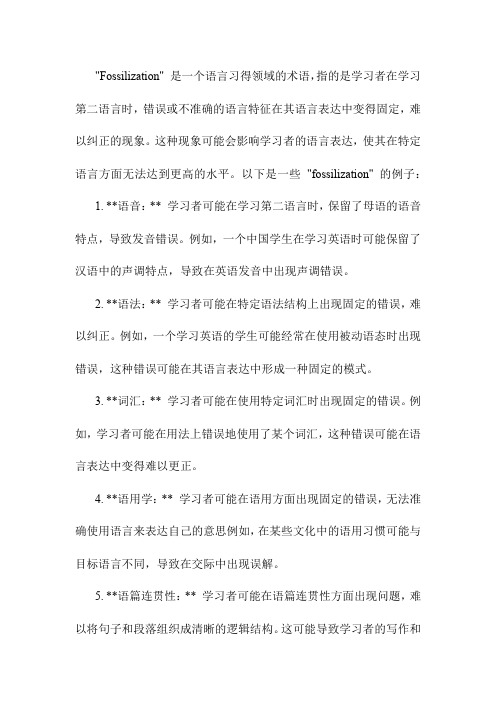
"Fossilization" 是一个语言习得领域的术语,指的是学习者在学习第二语言时,错误或不准确的语言特征在其语言表达中变得固定,难以纠正的现象。
这种现象可能会影响学习者的语言表达,使其在特定语言方面无法达到更高的水平。
以下是一些"fossilization" 的例子:1. **语音:** 学习者可能在学习第二语言时,保留了母语的语音特点,导致发音错误。
例如,一个中国学生在学习英语时可能保留了汉语中的声调特点,导致在英语发音中出现声调错误。
2. **语法:** 学习者可能在特定语法结构上出现固定的错误,难以纠正。
例如,一个学习英语的学生可能经常在使用被动语态时出现错误,这种错误可能在其语言表达中形成一种固定的模式。
3. **词汇:** 学习者可能在使用特定词汇时出现固定的错误。
例如,学习者可能在用法上错误地使用了某个词汇,这种错误可能在语言表达中变得难以更正。
4. **语用学:** 学习者可能在语用方面出现固定的错误,无法准确使用语言来表达自己的意思例如,在某些文化中的语用习惯可能与目标语言不同,导致在交际中出现误解。
5. **语篇连贯性:** 学习者可能在语篇连贯性方面出现问题,难以将句子和段落组织成清晰的逻辑结构。
这可能导致学习者的写作和口语表达显得杂乱或不连贯。
这些例子展示了"fossilization" 在语言习得中的不同表现形式。
这种现象通常是由于学习者在一定程度上固化了早期的学习习惯,或者由于持续性的错误反馈不足,导致这些错误得不到纠正。
在教学中,了解"fossilization" 可以帮助教师更好地理解学习者的语言发展,并针对性地提供支持和指导。
二语习得理论2012中介语

This is a office in the picture. It’s 12 and it is lunch time. But they look like very busy. There are three people. They are discussing and planning some one. There are a portable computer that is presentationing something at the stage. The stage also have some fast food. A girl is take the note at the same time, she have a cup of tea on her hand.
Interlanguage
中介语理论 (interlanguage Theory) 过渡语 语际语 第二语言学习者的语言 inter-:在……之间
母语 中介语
目的语
中介语理论 (interlanguage Theory)
英国著名语言学家、伦敦大学教授Larry Selinker 1969年在其论文“语言迁移”(language transfer)中首先使用
在外语学习中,语言迁移(language transfer)是指一种语言对学习另一种语言 产生的影响,也可能会产生正向迁移和负 向迁移。 负向迁移也称干扰(interference),是由 于套用母语模式或规则而产生的错误或不 合适的目的语形式。
二语习得理论对英语教学的启示

二语习得理论对英语教学的启示作为一门独立的学科,二语习得研究始于20世纪60年代末70年代初,80年代中期开始在我国起步。
20多年来,这一研究领域得到了迅速发展,并在各分支领域都有比较突出的成果面世。
与此同时,二语习得研究日益呈现出跨学科的特点,借鉴了如社会学、心理学、人类学等许多其它相关学科的研究成果,已远远超出了单纯的语言学范畴。
二语习得研究对英语学习的实践有着多维的指导意义,本文仅从英语教师的角度出发,浅析该理论中几个对于教学有启发的理论,并探讨将其应用于教学实践的可能性,以期改善教学效果、提高学生英语学习的水平和效能。
这些理论包括关键期理论、“i+1”理论和中介语石化理论。
一、关键期理论对关键期理论(critical period hypothesis)的研究始自1959年。
神经生理学家Penfield 和Roberts从大脑可塑性的角度,提出十岁以前是学习语言的最佳年龄。
哈佛大学心理学教授Lenneberg则从医学临床经验,以神经生理学的观点系统地解释语言学习的关键期。
他认为人的大脑从二岁开始侧化(lateralization,也叫做边化。
人的大脑左半球主要负责语言,而右半球感知非语言声音及音乐旋律,同时也支配着视觉和空间技能。
认知功能和感知功能位于大脑的某一半球上被称为侧化。
由于大脑的每个半球都有独特的功能优势,因此两个半球的专长是互利的。
侧化的过程被认为是一种发育成长的过程,即大脑侧化在基因中已安排好,但尚需时间逐渐实现侧化。
)在侧化完成前,人是用全脑来学习语言,约在11-19岁左右,大脑会完成侧化,从此,语言学习主要由左边大脑负责。
人脑“侧化”后的语言学习不如全脑学习时期来得好。
因此,语言学习最好在大脑完成侧化之前,这段时间被称为“语言学习关键期”。
后来的语言学家对这一假设多有论述。
虽然关键期理论还停留在假设层面,但是却似乎已经被国内的很多英语教师和家长奉为金科玉律了。
大家都把英语学习的年龄重心一再下移,外语学习者日益呈现低龄化特征。
石化现象
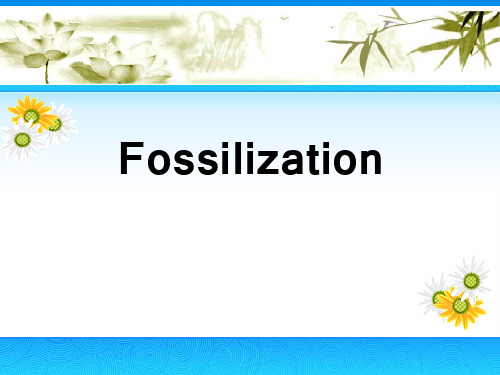
•
Thank
you!
b )Integrative motivation 融合型动机
It is thought that students who are most successful when learning a target language are those who like the people that speak the language, admire the culture and have a desire to become familiar with or even integrate into the society in which the language is used (Falk 1978). This form of motivation is known as integrative motivation.
当学习者达到语言能力就处于一种停滞不前的状态无法获得与本族语者相当的语言能力这一事实就称为石化
Fossilization
Contents
一、What is Fossilization 二、Different types of Fossilization 三、The causes of Fossilization 四、How to overcome
1,Fossilization in Vocabulary
黄色书籍”translate into“yellow books”
• 2,Fossilization in grammar
She want to go swimming.
Different types
A:individual VS group fossilization Individual fossilization:fossilization of errors and fossilization of language ability in pronunciation grammar and vocabulary. 1.Pronunciation: /l /and/n/、/ei/and/e/、/i:/and/i/ 2.Grammar 3.Vocabulary Group fossilization: It refers to the fossilization has become social phenomenon。Such as Hinglish, Pidgin English, Chinglish. B: temporary VS permanent fossilization Temporary fossilization: After correcting and training , our language can be more closed to the target language.
教师资格考试高级中学英语学科知识与教学能力试卷与参考答案(2025年)

2025年教师资格考试高级中学英语学科知识与教学能力模拟试卷与参考答案一、单项选择题(本大题有30小题,每小题2分,共60分)1、Which of the following is NOT a characteristic of communicative language teaching (CLT)?A. Emphasis on accuracy over fluencyB. Use of authentic materialsC. Focus on meaningful communicationD. Learner-centered approachAnswer: AExplanation: Communicative Language Teaching (CLT) emphasizes the importance of using the language for communication and interaction. It encourages fluency over accuracy, which means that while making errors is seen as a natural part of the learning process, the ability to communicate effectively is prioritized. Authentic materials, a focus on meaningful communication, and a learner-centered approach are all key features of CLT, making option A the correct choice as it contradicts the principles of CLT.2、In second language acquisition, the term ‘fossilization’ refers to:A. The process by which learners acquire grammatical rulesB. The point at which a learner’s interlanguage stops developingC. The initial stage of language learning where vocabulary is emphasizedD. The technique of using physical objects to teach language conceptsAnswer: BExplanation: Fossilization is a phenomenon in second language acquisition where the errors made by learners become permanent and resistant to change. This typically occurs when a learner reaches an intermediate level but fails to progress further, resulting in a stabilization of their interlanguage, which is the learner’s current state of knowled ge about the target language. Options A, C, and D do not accurately describe fossilization, thus B is the correct answer.3、The teacher is about to introduce a new topic in the English class. Which of the following phrases can best be used to engage the st udents’ interest and prepare them for the lesson?A. “Now, class, let’s dive into the depths of this new topic.”B. “Alright, everyone, it’s time to turn the page and explore something new.”C. “Today, we’re going to embark on an adventure through the worl d of literature.”D. “Let’s start by reviewing what we learned last class, and then we’ll move on to our new topic.”Answer: C. “Today, we’re going to embark on an adventure through the worldof literature.”Explanation: Option C uses an engaging and vivid phrase (“embark on an adventure”) that can capture the students’ interest and create a sense of excitement about the new topic. It also clearly indicates the direction of the lesson, which is beneficial for setting expectations and preparing the students for what to expect.4、In a reading comprehension activity, the teacher wants to ensure that students understand the main idea of a passage. Which of the following methods is most effective for this purpose?A. “Find the first sentence of each paragraph and summarize it.”B. “Circle the keywords in each paragraph and then discuss their meaning.”C. “Read the passage aloud and pause after each paragraph to discuss the main point.”D. “Write a one-sentence summary of the entire passage and share it with the cl ass.”Answer: D. “Write a one-sentence summary of the entire passage and share it with the class.”Explanation: Option D encourages students to think critically about the passage and distill its main idea into a concise statement. This method promotes active engagement with the text and helps students internalize the key information. It also allows the teacher to monitor each student’s understanding and provide feedback accordingly.5、Which of the following teaching methods emphasizes student-centered learning and encourages active engagement in the classroom?A、Lecture methodB、Auditory methodC、Interactive methodD、Cooperative methodAnswer: CAnalysis: The interactive method (选项C) is a student-centered approach that encourages active participation and interaction among students. This method promotes collaborative learning and discussion, which helps students develop critical thinking and communication skills.6、In the context of English language teaching, which of the following activities is most suitable for achieving the communicative competence of advanced high school students?A、Translating short paragraphs from English to ChineseB、Listening to and discussing authentic English-language podcastsC、Writing detailed summaries of poetryD、Parroting back English-language vocabulary listsAnswer: BAnalysis: Listening to and discussing authentic English-language podcasts (选项B) is the most suitable activity for achieving the communicative competence of advanced high school students. This activity provides real-worldlanguage input and encourages students to engage in meaningful communication, understand cultural nuances, and practice comprehension in an authentic context.7、The teacher is demonstrating a new vocabulary word to the high school students. Which of the following techniques would be most effective in helping the students retain the information?A. Using a direct translation from a familiar language.B. Providing a visual representation of the word in context.C. Asking students to repeat the word without giving any examples.D. Starting a brainstorming session about the word’s origin.Answer: B. Providing a visual representation of the word in context.Explanation: Visual aids, such as showing a picture of the object or situation that the word describes, can help students connect the new vocabulary with concrete examples and incidents. This concrete association is generally more effective in memory retention than a purely auditory or semantic approach.8、Which of the following is the most appropriate method to use when reviewing the structure of a complex literary text with advanced-level English language learners?A. Providing a comprehensive outline of the text structure.B. Encouraging students tomemorize a list of the text’s main structural elements, such as introduction, body paragraphs, and conclusion.C. Having students summarize the text in their own words before discussingthe structure.D. Asking students to rearrange the text elements without any prior guidance or explanation.Answer: C. Having students summarize the text in their own words before discussing the structure.Explanation: Reviewing the structure of a text is best accomplished by first having students summarize what they have read. This summarization phase activates prior knowledge and encourages students to engage more deeply with the content. Following this, d iscussion about the text’s structure can be conducted in a way that connects the new information to their personal understanding of the text. This method leads to a more active and meaningful learning experience.9、Which of the following activities best pr omotes students’ communicative competence?A) Completing grammar worksheets.B) Memorizing vocabulary lists.C) Role-playing a conversation at a restaurant.D) Writing a formal essay on a given topic.Answer: CExplanation: Communicative competence involves the ability to use language effectively in real-life situations. Role-playing a conversation at a restaurant (Option C) provides students with an opportunity to practice usinglanguage in a practical context, thereby enhancing their communicative skills. The other options focus more on discrete aspects of language learning, such as grammar, vocabulary, or writing, which do not necessarily promote communicative competence.10、When teaching pronunciation, what is a key factor that teachers should consider to help students improve their listening and speaking skills?A) Encouraging students to read aloud texts they have never seen before.B) Focusing solely on the pronunciation of individual sounds.C) Providing authentic listening materials that reflect natural speech patterns.D) Asking students to write down new vocabulary words and their phonetic transcriptions.Answer: CExplanation: To improve listening and speaking skills, it is essential for students to be exposed to authentic listening materials that reflect natural speech patterns (Option C). This exposure helps students become familiar with the rhythm, intonation, and connected speech features of the language, which are crucial for effective communication. While reading aloud and focusing on individual sounds can also be beneficial, they are not as effective in isolation as providing authentic listening practice. Writing down phonetic transcriptions can aid memory but does not directly enhance listening or speaking abilities.11、The teacher is using a visual aid to illustrate the concept of present perfect tense. Which of the following statements best describes the visual aid?A) A timeline showing events that started in the past and continue to the present.B) A series of photos of students from different eras.C) A chart comparing present perfect and present continuous tenses.D) A map showing the progression of a story.Answer: A) A timeline showing events that started in the past and continue to the present.Explanation: The present perfect tense is used to describe actions that started in the past and continue to the present. A timeline is an effective visual aid to demonstrate this concept by showing the continuity of events.12、In the context of teaching reading comprehension, which of the following strategies is most appropriate for helping students identify the main idea of a text?A)Paraphrasing sentences from the text.B)Summarizing the text in their own words.C)Asking students to predict the outcome of the story.D)Focusing on specific details and facts from the text.Answer: B) Summarizing the text in their own words.Explanation: Summarizing the text in their own words is a key strategy for identifying the main idea because it requires students to distill the essential information and concepts, rather than focusing on specific details or predictions. This helps them understand the overall message and purpose of the text.13、In which of the following works is the character Pip the main character?A. Oliver Twist - Charles DickensB. Great Expectations - Charles DickensC. Jane Eyre - Charlotte BronteD. Wuthering Heights - Emily BronteAnswer: B解析: Pip is the central character in “Great Expectations” by Charles Dickens. The novel explores Pip’s life and relationships and his journey to becoming a gentleman.14、Which novel features a deterministic theme, where the characters’ actions are largely determined by their environment and societal conditions?A. 1984 - George OrwellB. To Kill a Mockingbird - Harper LeeC. Crime and Punishment - Fyodor DostoevskyD. The Great Gatsby - F. Scott FitzgeraldAnswer: C解析: “Crime and Punishment” by Fyodor Dostoevsky is known for its deterministic themes, where the narrator Raskolnikov’s actions are influenced deeply by his harsh environment and societal conditions, reflecting wider themes of free will versus determinism.15、The following sentence can be properly rewritten as a passive voice without changing the meaning:A)The stone was thrown by Tom.B)Tom threw the stone.C)By Tom, the stone was thrown.D) A stone was thrown by Tom on the ground.Answer: CExplanation: The correct passive voice form changes the subject to the receiver of the action (the stone) and uses the appropriate form of “to be” combined with the past participle. In this case, “By Tom, the stone was thrown” is the proper passive voice construction.16、Which of the following sentences correctly uses the past perfect tense?A)She had finished her homework before dinner time.B)She finishes her homework after dinner.C)She has finished her homework every day.D)She will finish her homework before it’s too late.Answer: AExplanation: The past perfect tense is used to describe an action that happened before another past action. In this question, the sentence refers to an action (finishing homework) t hat happened before “dinner time.” The past perfect tense construction is “had + past participle,” hence “had finished” in option A is the correct choice. The other options use the present simple or future perfect tenses, which are not appropriate for the context.17、Which of the following is NOT a communicative competence skill according to Canale and Swain (1980)?A. Grammatical competenceB. Sociolinguistic competenceC. Strategic competenceD. Discourse competenceAnswer: EExplanation: Canale and Swain’s model of communicative competence includes grammatical competence (knowledge of vocabulary, morphology, syntax, semantics, and phonology), sociolinguistic competence (understanding of how language use varies according to social context), strategic competence (ability to compensate for lack of knowledge), and discourse competence (ability to connect sentences together coherently). The correct choice is not listed among the options, but if we assume that ‘E’ represents an option not given, it would be the correct answer by default. However, if this is a mistake and one of the listed options is supposed to be incorrect, then the question needs to be reviewed.18、When designing a lesson plan, which of the following steps should come first?A. Identifying learning objectivesB. Selecting teaching materialsC. Planning assessment methodsD. Organizing classroom activitiesAnswer: AExplanation: In effective lesson planning, identifying learning objectives is the crucial first step. These objectives guide the selection of teachingmaterials, planning of assessment methods, and organization of classroom activities. They define what students should know or be able to do at the end of the lesson, ensuring that all other components of the lesson are aligned with these goals.19.The following sentence contains an error in verb tense. Which sentence is correct?A. The students are doing their homework in the library.B. The students had done their homework when the teacher came in.C. The students will be doing their homework in the library next week.D. The students were doing their homework when the teacher came in.Answer: DExplanation: Option D is correct because it uses the past continuous tense to describe an action that was happening at a specific moment in the past (when the teacher came in). The other options use incorrect tenses: A uses the present continuous, B uses the past perfect, and C uses the future continuous.20.Choose the word that best completes the sentence.The teacher_______the students to participate in the discussion actively.A. encouragesB. discouragedC. discouragingD. will encourageAnswer: AExplanation: Option A is correct as “encourages” is the correct form of the verb to use in this context, which means “to inspire or motivate someone to do something.” The other options do not fit the context: B is the past tense of discourage, C is the present participle, and D is the future tense of encourage.21、Which of the following best describes the relationship between a thesaurus and a dictionary?A、A thesaurus provides synonyms for words, while a dictionary offers definitions and information about words.B、A thesaurus lists homophones, while a dictionary provides synonyms.C、A thesaurus and a dictionary are both conduits for personal expression.D、A thesaurus and a dictionary are interchangeable tools for writing.Answer: AExplanation: A thesaurus is primarily used for finding synonyms and related words, while a dictionary provides definitions and other information about words, including their etymology, pronunciation, and usage. These tools serve different purposes and are not interchangeable.22、Which层面的理解方式最能体现阅读活动中的深度对话与批判性思维?A、表层理解B、中层理解C、深层理解D、超层次理解Answer: CExplanation: Deep understanding (深层理解) refers to a comprehensive and critical interpretation of a text, including its themes, symbols, and underlying messages. It involves not just comprehension at a surface level (表层理解) or a medium level (中层理解), but a deeper engagement with the text that encourages critical thinking and reflection.23.The following sentences highlight the flexible use of grammar in English. Which sentence demonstrates the use of “have” and “has” to indicate possession?A. Harry/typescripts well.B. The books/on my desk are all new.C. She/have a cat named Lily.D. Her sister has a car.Answer: C.Explanation: The correct usage is “She has a cat named Lily” because “has” is used with “she,” the third-person singular pronoun.24.In English, adjectives can have comparative and superlative forms. Which sentence uses the superlative form to suggest that a particular class of students is the best in terms of punctuality?A. The chemistry students are more punctual than the biology students.B. The chemistry class is the most punctual at our school.C. The biology class is more punctual than most classes in our school.D. While chemistry students are punctual, biology students have a few late minutes.Answer: B.Explanation: The sentence “The chemistry class is the most punctual at our school” uses the superlative form “most punctual” to indicate that the chemistry class is the best or most punctual compared to other classes.25.Which of the following activities best promotes students’ comm unicative competence in an English language classroom?A)Memorizing vocabulary listsB)Reading silently from a textbookC)Engaging in role-play dialoguesD)Writing essays on given topicsAnswer: C) Engaging in role-play dialoguesExplanation: Communicative competence refers to the ability to use language appropriately in different social contexts. Role-play dialogues provide learners with opportunities to practice using language in a way that simulates real-life situations, which is essential for developing their ability to communicate effectively. The other options, while useful for building specific skills, do not directly promote the interactive and communicative aspects of language learning.26.In the context of teaching grammar, what does the term ‘form-focused instruction’ refer to?A)Teaching grammar rules as a separate subject without integrating them into languagepracticeB)Focusing solely on the accuracy of pronunciation and intonationC)Integrating attention to grammatical forms within the context of meaningfulcommunicationD)Encouraging students to learn grammar through trial and error without explicitguidanceAnswer: C) Integrating attention to grammatical forms within the context of meaningful communicationExplanation: Form-focused instruction is an approach to language teaching that involves drawing students’ attention to grammatical features during meaningful communication. This method aims to improve both form (the structure of the language) and meaning (the content of the message) simultaneously, thereby enhancing students’ overall language proficiency. It contrasts with approaches that treat grammar as an isolated set of rules or those that avoid direct instruction on grammar altogether.27.The teacher in the following scenario demonstrates which principle of classroom management?A)ConsistencyB)FlexibilityC)AutonomyD)ParticipationAnswer: A) ConsistencyExplanation: Consistency is a key principle of classroom management thatinvolves maintaining the same rules, expectations, and consequences for students. In the scenario, the teacher consistently applies the same rules and consequences, which helps to create a stable and predictable learning environment.28.Which of the following is an effective strategy for promoting student engagement in a reading activity?A)Reading the entire text aloud to the classB)Providing students with a list of vocabulary words to memorizeC)Encouraging students to work independently on a reading passageD)Asking students to predict the outcome of a story based on the title and illustrationsAnswer: D) Asking students to predict the outcome of a story based on the title and illustrationsExplanation: Encouraging students to predict the outcome of a story based on the title and illustrations is an effective strategy for promoting engagement because it activates their prior knowledge and encourages critical thinking. This activity also helps to build anticipation and interest in the text.29、Which of the following is NOT a principle of teaching pronunciation to high school students?(A) Emphasizing the phonetic environment and structural analysis.(B) Incorporating pronunciation practice into listening and speaking activities.(C) Using minimal pairs to distinguish similar sounds.(D) Focusing solely on spelling of words.Answer: (D) Focusing solely on spelling of words.解析: 教师在教授高中学生的英语发音时,不应仅强调单词的拼写,因为发音和拼写之间存在复杂的关系,而且强调拼写容易忽视发音的实际实践。
英汉古生物学词汇
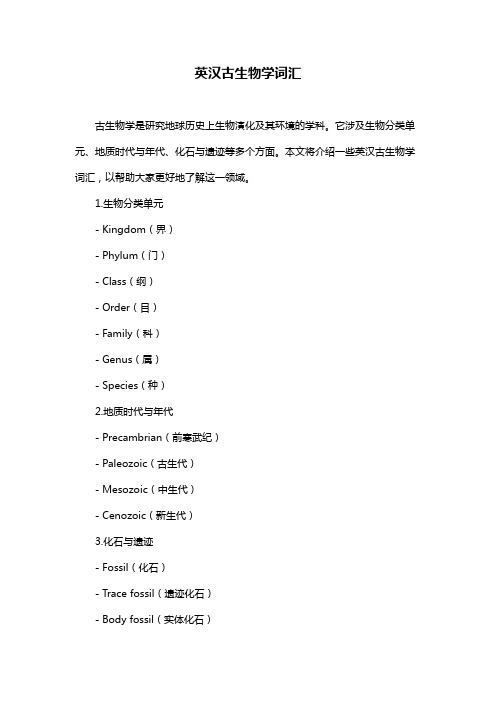
英汉古生物学词汇古生物学是研究地球历史上生物演化及其环境的学科。
它涉及生物分类单元、地质时代与年代、化石与遗迹等多个方面。
本文将介绍一些英汉古生物学词汇,以帮助大家更好地了解这一领域。
1.生物分类单元- Kingdom(界)- Phylum(门)- Class(纲)- Order(目)- Family(科)- Genus(属)- Species(种)2.地质时代与年代- Precambrian(前寒武纪)- Paleozoic(古生代)- Mesozoic(中生代)- Cenozoic(新生代)3.化石与遗迹- Fossil(化石)- Trace fossil(遗迹化石)- Body fossil(实体化石)-化石燃料(Fossil fuel)- Lagersttte(沉积盆地)4.生物演化与演化历程- Evolution(演化)- Natural selection(自然选择)- Speciation(物种形成)- Adaptation(适应)- Macroevolution(大演化)- Microevolution(小演化)5.生态环境与古生态学- Habitat(栖息地)- Ecological niche(生态位)- Paleoecology(古生态学)- Paleoenvironment(古环境)- Biogeography(生物地理学)6.地球生物学与生物地球化学- Geobiology(地球生物学)- Biogeochemistry(生物地球化学)- Organic geochemistry(有机地球化学)- Isotope geochemistry(同位素地球化学)- Stable isotope ratio(稳定同位素比值)7.实验古生物学与古生物技术- Paleobiology(实验古生物学)- Paleotechnology(古生物技术)- Fossil preparation(化石制备)- Imaging technique(成像技术)- Virtual paleontology(虚拟古生物学)8.古生物学在其他学科中的应用- Paleoanthropology(古人类学)- Paleoclimatology(古气候学)- Paleoceanography(古海洋学)- Paleogeography(古地理学)- Stratigraphy(地层学)掌握这些英汉古生物学词汇,将有助于我们更好地了解地球历史上的生命演变及其环境。
Fossilization five central issues
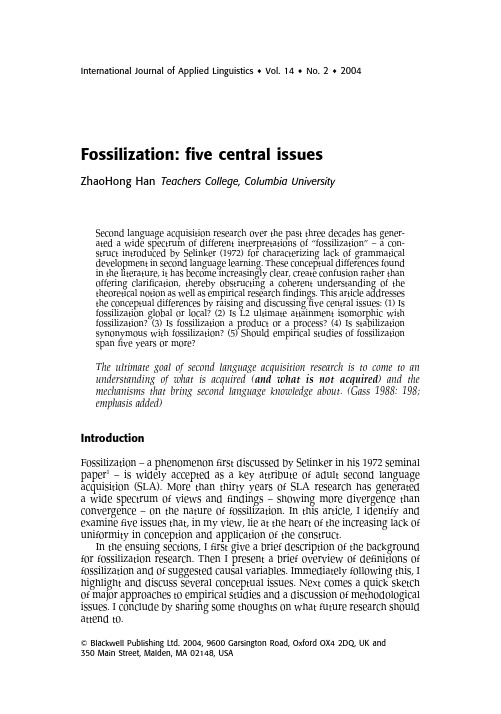
Fossilization: five central issuesZhaoHong Han Teachers College, Columbia UniversitySecond language acquisition research over the past three decades has gener-ated a wide spectrum of different interpretations of “fossilization” – a con-struct introduced by Selinker (1972) for characterizing lack of grammatical development in second language learning. These conceptual differences found in the literature, it has become increasingly clear, create confusion rather than offering clarification, thereby obstructing a coherent understanding of the theoretical notion as well as empirical research findings. This article addresses the conceptual differences by raising and discussing five central issues: (1) Is fossilization global or local? (2) Is L2 ultimate attainment isomorphic with fossilization? (3) Is fossilization a product or a process? (4) Is stabilization synonymous with fossilization? (5) Should empirical studies of fossilization span five years or more?The ultimate goal of second language acquisition research is to come to an understanding of what is acquired (and what is not acquired) and the mechanisms that bring second language knowledge about. (Gass 1988: 198;emphasis added)IntroductionFossilization – a phenomenon first discussed by Selinker in his 1972 seminal paper1– is widely accepted as a key attribute of adult second language acquisition (SLA). More than thirty years of SLA research has generated a wide spectrum of views and findings – showing more divergence than convergence – on the nature of fossilization. In this article, I identify and examine five issues that, in my view, lie at the heart of the increasing lack of uniformity in conception and application of the construct.In the ensuing sections, I first give a brief description of the background for fossilization research. Then I present a brief overview of definitions of fossilization and of suggested causal variables. Immediately following this, I highlight and discuss several conceptual issues. Next comes a quick sketch of major approaches to empirical studies and a discussion of methodological issues. I conclude by sharing some thoughts on what future research should attend to.Fossilization: five central issues w213 Before I proceed, however, I wish to make it clear that the issues dis-cussed and views expressed here are based on a dual assumption: namely, that second language development is on the whole a dynamic process –meaning it continues to evolve given continuous input, adequate motiva-tion, readiness, and sufficient opportunity to use the language – but that at the same time it exhibits paradoxes such as systematicity and fragmentality; permeability and resistance; variability and premature stability. BackgroundTo begin, let us look at an extract from an obituary of the renowned physicist, Chien-Shiung Wu (1912–1997) published in The Guardian, May 13, 1997:Professor Chien-Shiung Wu, who has died aged 83, was a physicist whose brilliance carried her from obscurity in China during the early thirties to fame in the United States during and after the second world war. As a postdoctoral physicist, speaking idiosyncratic English but with a unique knowledge of gaseous fission products, she was called in by the great Enrico Fermi when, in 1942, an experimental reactor began to run down within weeks of going critical. She quickly and correctly diagnosed poisoning by the rare gas xenon, produced in the fission process....In 1992, Wu came to Europe for an 80th birthday symposium held in her honor at the international Cern laboratory at Geneva. She was delighted and, with her early difficulties with English still evident, talked about her beta decay work and the importance of choosing critical experiments.It is said that few left the meeting uninspired by her amazing clarity of thought, or unmoved by the power of her quiet yet very special genius.(emphasis added)Professor Chien-Shiung Wu, who arrived in the U.S. in 1936 at the age of 24 and had since lived and worked there until her death at 83, had 56 years of exposure to English, her second language. She was nevertheless unable to overcome all of her early difficulties with English, despite her undoubted intelligence and her enormous scientific achievements over the intervening decades. Why were some of her early language difficulties insurmountable? Professor Wu’s case is typical of millions of adult L2 learners who, despite long exposure and concerted efforts, become caught up somewhere in the learning process and find themselves unable to progress.This phenomenon of the non-progression of learning despite continuous exposure to input, adequate motivation to learn, and sufficient opportunity for practice – generally referred to in the literature as “fossilization” –became a central concern for SLA researchers almost as soon as the research field © Blackwell Publishing Ltd. 2004214w ZhaoHong Hanitself came into existence. More profoundly, it has been seen as part of a larger background issue:One of the most enduring and fascinating problems confronting research-ers of second language acquisition (SLA) is whether adults can ever acquire native-like competence in a second language (L2), or whether this is an accomplishment reserved for children who start learning at a relatively early age. As a secondary issue, there is the question of whether those rare cases of native-like success reported amongst adult learners are indeed what they seem, and if they are, how it is that such people can be successful when the vast majority are palpably not. (Kellerman 1995: 219)While Kellerman recognized the difference in ultimate attainment between child first-language acquisition and adult SLA, Towell and Hawkins (1994: 2) further observed:For most of us the acquisition of second language is less spectacular.If we are past the age of around 7–10 years the acquisition of an L2, in marked contrast to the way we acquired our first language (L1), can turn out to be rather slow, laborious and, even in talented L2 learners, tends to stop short of native-like proficiency. This “stopping short” has been referred to as fossilization (Selinker 1972) or incompleteness (Schachter 1990). It is one of the noticeable characteristics of second language acquisition.Thus, Towell and Hawkins explicitly linked fossilization to L2 ultimate attainment.For more than three decades now, the construct of fossilization has been subjected to theoretical and empirical queries under a range of different terms, not only under its by now traditional name of “fossilization” (Selinker 1972; passim the research literature), but also as “plateau” (e.g. Flynn and O’Neil 1988), “fossilized variations” (Schachter 1996), “permanent optionality”(Sorace 1996), “endstate” (Lardiere 1998), and so forth.2Underlying the various theoretical and empirical attempts, among other things, are mis-cellaneous conceptualizations of fossilization. Even a short excursion into the definitions, denotations and explanations that have so far been suggested will allow us to develop a sense of the conceptual disparity.DefinitionsThe term “fossilization” was introduced to the field of SLA by Selinker in 1972 on the basis of his observation that the vast majority of second language learners fail to achieve native-speaker competence. Fossilization,© Blackwell Publishing Ltd. 2004Fossilization: five central issues w215 as then conceptualized, implicated both a cognitive mechanism known as the fossilization mechanism(Selinker 1972: 221) and a performance-related structural phenomenon. As a cognitive mechanism, it was thought to be a constituent of a latent psychological structure that dictates a learner’s acquisi-tion of a second language. As a performance-related structural notion, it denoted specifically “the regular reappearance in second-language perform-ance of linguistic phenomena which were thought to be eradicated in the performance of the learner” (1972: 211). The two functions were conceived to be interrelated:Fossilization [is] a mechanism...[that] underlies surface linguistic mater-ial which speakers will tend to keep in their IL productive performance, no matter what the age of the learner or the amount of instruction he receives in the TL. (Selinker 1972: 229)Further, as a performance-based structural notion, fossilization was indirectly, rather than directly, defined in terms of putative fossilizable structures:[F]ossilizable linguistic phenomena are linguistic items, rules, and sub-systems which speakers of a particular L1 tend to keep in their IL relative to a particular TL, no matter what the age of the learner or amount of explanation and instruction he receives in the TL...(Selinker 1972: 215) This earliest conception suggests several properties of fossilization. First, fossilizable structures are persistent; second, they are resistant to external influences; and third, fossilization affects both child L2 learners and adult L2 learners alike. Behind these, it is important to note, is the implication that L2 learners lack the ability to attain native-like competence. And it is precisely this view that accords the construct of fossilization its intrinsic interest; it is what has drawn the attention of many second language researchers and practitioners.Since 1972, the notion of fossilization has seen a gradual abstraction and an expansion in its scope. Selinker and Lamendella (1978: 187) explicitly defined it in terms of:...a permanent cessation of IL learning before the learner has attained TL norms at all levels of linguistic structure and in all discourse domains in spite of the learner’s positive ability, opportunity, and motivation to learn and acculturate into target society.Fossilization, in the view expressed here, is coterminous with permanent cessation of learning, thereby going beyond the “backsliding” of linguistic structures that were thought to be eradicated. The scope of “fossilizable structures” was also extended from “linguistic items, rules and sub-systems”to “all levels of linguistic structure and in all discourse domains”. The role © Blackwell Publishing Ltd. 2004216w ZhaoHong Hanplayed by the “learner’s positive ability, opportunity, and motivation” was minimized, thereby suggesting the inevitability of fossilization and thus its innateness.In Selinker and Lakshmanan (1992), fossilization is defined structurally in terms of persistent non-target-like structures, thereby incorporating long-term persistence as a defining feature of empirical discovering of fossilization.Fossilization in the sense of a general cessation of learning would, in Selinker’s view, culminate in ultimate fossilized competence (Selinker 1996a,b):[F]ossilization is the process whereby the learner creates a cessation ofinterlanguage learning, thus stopping the interlanguage from develop-ing, it is hypothesized, in a permanent way...The argument is that no adult can hope to ever speak a second language in such a way that s/he is indistinguishable from native speakers of that language. (Selinker 1996b)On this view, then, the ultimate attainment of adult L2 acquisition is a fossil-ized interlanguage; fossilization is inevitable; and no adult L2 learner would ever be able to pass for native in all contexts.Thus, since 1972, Selinker has broadened the referential scope of fossil-ization: from “backsliding” to “cessation of learning” and to “ultimate attain-ment”,3 gradually moving away from the 5% estimate that he made initially concerning the hypothesized size of the successful SLA population to the claim that no adult L2 learner can hope to achieve native-like competence in all discourse domains. Accompanying this change in conception is also an expansion of the linguistic scope of fossilization, from fossilizable structures (i.e. local fossilization) to a fossilized interlanguage (i.e. global fossilization). Meanwhile, the dual functions of fossilization, namely, its being both a cognitive mechanism and a structural–behavioral phenomenon, which were explicit in the earliest postulation, tend to be less clear-cut in his later definitions.Beyond Selinker’s definitions, the SLA literature over the past three decades has seen a good variety of conceptions of fossilization. Many are in essence extended interpretations of the notion as originally proposed by Selinker in 1972. Lowther (1983: 127), for example, has the following interpretation of fossilization: “Fossilization, as presented in much of the literature, is understood to be the inability of a person to attain nativelike ability in the target language”(emphasis added). This is reminiscent of Selinker’s view of fossilization as fundamentally a cognitive mechanism.Most SLA researchers, however, have followed and built on the perform-ance dimension of Selinker’s (1972) dual definition. Ellis (1985: 48), for instance, offers the view below:Fossilized structures can be realized as errors or as correct target language forms. If, when fossilization occurs, the learner has reached a stage of© Blackwell Publishing Ltd. 2004Fossilization: five central issues w217 development in which feature x in his interlanguage has assumed the same form as in the target language, then fossilization of the correct form will occur. If, however, the learner has reached a stage in which feature y still does not have the same form as the target language, the fossilization will manifest itself as error.The origin of this view that there are fossilized errors as well as fossilized target-like forms can be traced back to Vigil and Oller (1976: 282): [W]e will extend the notion of fossilization to any case where grammati-cal rules, construed in the broadest sense, become relatively permanently incorporated into a psychologically real grammar....[A]n adequate explanation must account for the incorporation of rules intodeveloping grammars in relatively permanent form regardless of whether those rules conform or do not conform to the norms of the language which is being learned. It is not only the fossilization of so-called ‘errors’that must be explained, but also the fossilization of correct forms that conform to the target language norms.However, this opinion is not widely endorsed. Most researchers, instead, are of the view that the term ‘fossilization’ should be reserved exclusively for non-target-like forms. Hyltenstam (1988: 68), for example, gives the following definition of fossilization:Fossilization – according to observations – is a process that may occur in the second language acquisition context as opposed to first language acquisition. It covers features of the second language learner’s inter-language that deviate from the native speaker norm and are not develop-ing any further, or deviant features which – although seemingly left behind – re-emerge in the learner’s speech under certain conditions.Thus, the learner has stopped learning or has reverted to earlier stages of acquisition.Here, fossilization – in line with Selinker’s (1972) view – is associated with deviant forms, and ‘backsliding’ is identified as the prime phenomenological manifestation of fossilization. A similar conception has been entertained by many others, including Preston, who identifies fossilization with the “persistence of an incorrect form in the emerging interlanguage” (1989: 245).While fossilization has so far been largely construed as an IL product, some researchers see it as a process – “a process whereby repeated practice and exposure to the language does not lead to any further development”(Sharwood Smith 1994: 37).Further, there is also the conception that fossilization is a stage in the interlanguage process. Bley-Vroman (1989: 47–9), for example, asserts:© Blackwell Publishing Ltd. 2004218w ZhaoHong HanIt has long been noted that foreign language learners reach a certain stage of learning – a stage short of success – and that learners then permanently stabilize at this stage. Development ceases, and even serious conscious efforts to change are often fruitless. Brief changes are sometimes observed, but they do not ‘take’. The learner backslides to the stable state.Fossilization is thus taken to be “permanent stabilization”, and as such, an ultimate stage in the interlanguage process. Corroborating this view, Tarone (1994: 1715) points out: “A central characteristic of any interlanguage is that it fossilizes – that is, it ceases to develop at some point short of full identity with the target language.” Tarone’s claim is worth noting for its strong implication that fossilization is inevitable, and that it is what characterizes the ultimate attainment of every learner.Summing up: fossilization – in the eyes of many – is a product as well as a process;4it affects the entire IL system as well as its sub-systems; it is literally permanent as well as relatively permanent; it is persistent and resistant; for some researchers it happens to every learner and for others to only some learners (for a detailed discussion of these positions, see Han 1998). It is a stage of interlanguage learning, therefore incorporating the fossilization of correct as well as of incorrect forms (e.g. R. Ellis 1985; Vigil and Oller 1976). It is externally manifested as well as internally determined. Furthermore, it is suggested that fossilization may represent the ultimate outcome of L2 learning (e.g. Tarone 1994).Putative causal variablesOver the years, the lack of uniformity in the understanding of the notion of fossilization has led researchers to apply the term to a wide range of phenomena, including but not limited to the ones below:•backsliding (e.g. R. Ellis 1985; Schachter 1988; Selinker 1972)•stabilized errors (e.g. Schumann 1978)•learning plateau (e.g. Flynn and O’Neil 1988)•typical error (e.g. Kellerman 1989)•persistent non-target-like performance (e.g. Mukattash 1986)•low proficiency (e.g. Thep-Ackrapong 1990)•de-acceleration of the learning process (e.g. Washburn 1991)•ingrained errors (Valette 1991)•systematic use of erroneous forms (Allwright and Bailey 1991)•errors made by advanced learners (e.g. Selinker and Mascia 1999)•variable outcomes (Perdue 1993)•cessation of learning (e.g. Odlin 1993)•structural persistence (e.g. Schouten 1996)© Blackwell Publishing Ltd. 2004Fossilization: five central issues w219•errors that are impervious to negative evidence (Lin and Hedgcock 1996)•random use of grammatical and ungrammatical structures (Schachter 1996)•ultimate attainment (passim the SLA literature)•long-lasting free variation (R. Ellis 1999)•persistent difficulty (Hawkins 2000)•inability to fully master target language features (passim the SLA literature).These denotations have, in turn, spawned a myriad of explanations. In the SLA literature, explicit and implicit explanations of fossilization abound. Some of them are based on empirical studies ostensibly devoted to the subject matter of fossilization, and some are sheer speculations without any empir-ical basis. The suggested causal variables include but are not limited to:•lack of instruction (e.g. Krashen and Seliger 1975, 1976; Schmidt 1983)•absence of corrective feedback (e.g. Higgs and Clifford 1982; Lightbown and Spada 1999; Tomasello and Herron 1988; Vigil and Oller 1976; Valette 1991)•satisfaction of communicative needs (e.g. Corder 1978, 1983; R. Ellis 1985;Klein 1986; Klein and Perdue 1993; Kowal and Swain 1997; Selinker and Lamendella 1978; Wong-Fillmore 2002)•age (passim the SLA literature)•lack of written input (e.g. Schmidt 1983; VanPatten 1988)•false automatization (Hulstijn 1989, 2002a)•end of sensitivity to language data (Schnitzer 1993)•lack of access to UG learning principles (White 1996)•learning inhibits learning5 (Elman et al. 1996)•language transfer (e.g. Han 2000; Jain 1974; Kellerman 1989; Major 2002;Selinker and Lakshmanan 1992).For a comprehensive list and discussion of the suggested causal variables, see Han (2003a, 2004).In brief, over the years, the term fossilization has come to be associated with a wide range of variables, exhibiting divergent interpretations of the construct. The lack of uniformity in the conceptualization and application of the notion, while creating confusion, points to, among other things, the fact that fossilization is no longer a monolithic concept as it was in its initial postulation, but rather a complex construct intricately tied up with varied manifestations of failure.The proliferation of uses of the term fossilization is matched by the rich spectrum of explanatory accounts, with almost every existing perspective on SLA represented (e.g. the cognitive, the neural, the environmental, and the socio-affective). Just as each idiosyncratic application of the term potentially adds a new empirical property to fossilization, each explanatory account reveals a potential causal variable, and together they weave a large and intricate picture of fossilization.© Blackwell Publishing Ltd. 2004220w ZhaoHong HanIt is important to note that the various theoretical and empirical attempts made over the years have resulted more in conceptual diversity than uni-formity, though all recognize fossilization as a central characteristic of SLA. The differences seem to center around four issues: (1) whether fossilization is global or local; (2) whether L2 ultimate attainment is isomorphic with fossilization; and (3) whether fossilization is a product or a process, and (4) whether stabilization and fossilization are synonymous. We will now look at each in turn.Issue 1: Is fossilization global or local?Some researchers have viewed fossilization as occurring globally to the entire interlanguage system; others have maintained that fossilization could only happen locally in parts of the subdomains of the interlanguage system. It may be recalled that Selinker himself has shifted his perception from local to global. Mirroring this difference, the SLA literature sees the use of “fossilized error”, on the one hand, suggesting local fossilization, but “fossilized competence” and “fossilized learner”, on the other hand, sug-gesting global fossilization. As an illustration, Tarone, Frauenfelder and Selinker (1976; see also Selinker 1992) argue that two types of learners can be distinguished: fossilized learners (referred to as “Type 1 learners”) and non-fossilized learners (referred to as “Type 2 learners”). According to the researchers, a Type 1 learner’s interlanguage is characterized by cessation of learning or stability due to his or her inability to change the IL system. In contrast, a Type 2 learner’s interlanguage is dynamic in that it changes over time, thereby suggesting continuation of learning. Apparently, such a bifurcation of L2 learners is conceptually flawed. For one thing, it essentially relies only on learners’ production (i.e. the observable behavior) to determine whether learning is occurring or not, and inasmuch as it ignores the under-lying internal, invisible, and cognitive processes, it reflects an oversimplistic and a behavioristic view of learning.As of yet, it is crucial to note, evidence of global fossilization remains entirely impressionistic.6 More precisely, global fossilization is assumed rather than established. The preponderance of the available empirical evidence points instead to local fossilization (Han 2003a,b, 2004); that is, fossilization only hits certain linguistic features in certain subsystems of the interlanguage of individual learners, while other linguistic features in the same subsystems are successfully acquired or continue to evolve.Issue 2: Is L2 ultimate attainment isomorphic with fossilization? One major confusion that arises in the current SLA literature concerns the fact that the term fossilization is sometimes adopted from a cross-learner© Blackwell Publishing Ltd. 2004Fossilization: five central issues w221 perspective to refer to L2 ultimate attainment, and at other times from a within-learner perspective, in which case it is tied to local cessation of learning pertinent to individual learners’ interlanguage (e.g. stabilized errors). Also closely linked to this confusion is the term ultimate attainment, whose nature in the context of L2 has never been clarified beyond its literal meaning of “end state” or “terminal state”. Birdsong (1999: 10), for example, defines it as “the end state or asymptote of L2A, however close to or far from nativelike that state may be”. A close reading of the SLA literature, however, shows that there are at least two general facets to L2 ultimate attainment: (a)general failure (Bley-Vroman 1989); and (b) differential success and failure. We will look at each in turn.General failureDespite the lack of large-scale and comprehensive studies able to demonstrate the phenomenon scientifically, an impressionistic look at learners in different acquisition contexts produces prima facie evidence that the “majority of adult learners wind up far from the target”, and that “their interlanguage remains distinct from the mature L2 in a good number of ways” (Eubank’s 1997 SLART-L on-line communication7).Success in this context, in the view of some researchers, means complete mastery of a second language, namely, the attaining of “all levels of linguistic structure and in all discourse domains” (Selinker and Lamendella 1978: 373; see also Sharwood Smith’s 1997 SLART-L on-line communication). The gen-eral lack of such success is characteristically seen to reside in the imbalance between the rate of success and the rate of failure.8 Over the years, the 5% success rate proposed by Selinker (1972) has been widely quoted. Some argue that this figure is too conservative (Birdsong 1999, 2004; Seliger, Krashen and Ladefoged 1975), while others claim that even 5% is a gross overestimate (Long 1990; Gregg 1996).9 If we follow Gregg’s (1996: 52) speculative argument that “truly native-like competence in an L2 is never attained”, there can be no question of any imbalance since no learner would ever achieve perfect mastery of an L2 (cf. Sorace 1993). Still other researchers (e.g. Kellerman 1995) who quote the 5% figure do so merely as a general recognition of the fact that there is overwhelmingly more failure than success in adult L2 acquisition.In the SLA literature, it is also worth noting, there exist different views on what success should entail. As mentioned, for some, success means complete mastery of every facet of the L2; for others (e.g. Schachter 1996), however, it means achieving only native-like competence in the core grammar of L2 without taking account of linguistic peripherals. Despite the lack of consensus, the point nevertheless remains that in whichever sense, complete success is not achievable in post-adolescent L2 acquisition. This claim has gained considerable support from studies of ultimate attainment in so-called © Blackwell Publishing Ltd. 2004“near-natives” (e.g. Coppieters 1987; Sorace 1993).10Although they each focused only on a small number of linguistic subsystems, Coppieters (1987) and Sorace (1993) both present convincing evidence of the existence of a significant gap, assumed to be permanent, between the interlanguage grammar and the mature native grammar.Counterevidence, to a lesser extent, is also available (Birdsong 1992; Bongaerts 1999; Ioup et al. 1994; White and Genesee 1996). White and Genesee (1996), for instance, come to the conclusion that it is possible for adult L2 learners to acquire native-like competence. Birdsong (1992), on the other hand, offers mixed evidence from his subjects showing that with some subsystems complete mastery is possible, whereas with other sub-systems it is not. Findings such as this speak to the necessity of a non-monolithic view on ultimate attainment. And this takes us to the second facet of L2 ultimate attainment: differential success and failure.Differential success/failureIn addition to general failure, L2 ultimate attainment features differential success.11 Among others, Bley-Vroman (1989: 49) points out a great range of individual variations:[F]ew adults are completely successful; many fail miserably, and manyachieve a very high level of proficiency, given enough time, input, effort and given the right attitude, motivation and learning environment.Others come between the two extremes.In writing on the longitudinal studies of the ESF project, Perdue (1993: 8) particularly mentions the following as a salient feature of the untutored L2 learners:...they achieve very different degrees of language mastery. Few, it seems, achieve native-like proficiency. Some stop (or, to use Selinker’s 1972, term, ‘fossilize’) at a very elementary level. Others come between the two extremes.Similarly, Hyltenstam and Abrahamsson (2001: 164) note:The ultimate attainment of individual L2 learners varies enormously in its approximation to nativelike proficiency, although some individuals may reach very high levels of proficiency and in some cases even pass as native speakers.All these researchers, adopting a cross-learner view, stress qualitative indi-vidual variations in attaining competence in an L2, and that learners, instead of© Blackwell Publishing Ltd. 2004。
常用地质学英语词汇
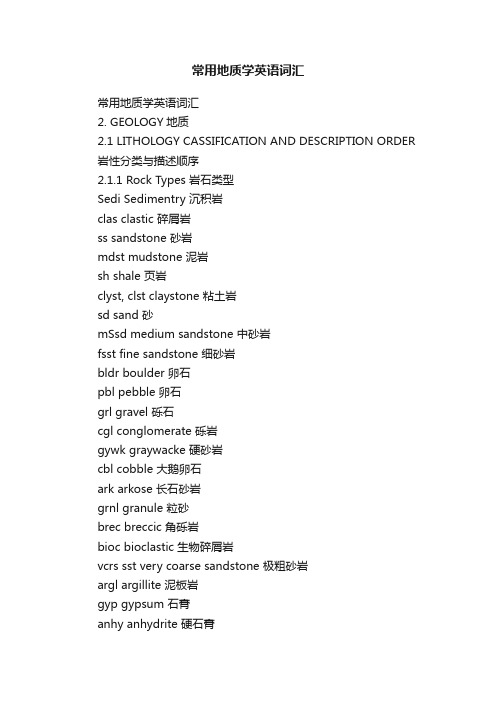
常用地质学英语词汇常用地质学英语词汇2. GEOLOGY地质2.1 LITHOLOGY CASSIFICATION AND DESCRIPTION ORDER 岩性分类与描述顺序2.1.1 Rock Types 岩石类型Sedi Sedimentry 沉积岩clas clastic 碎屑岩ss sandstone 砂岩mdst mudstone 泥岩sh shale 页岩clyst, clst claystone 粘土岩sd sand 砂mSsd medium sandstone 中砂岩fsst fine sandstone 细砂岩bldr boulder 卵石pbl pebble 卵石grl gravel 砾石cgl conglomerate 砾岩gywk graywacke 硬砂岩cbl cobble 大鹅卵石ark arkose 长石砂岩grnl granule 粒砂brec breccic 角砾岩bioc bioclastic 生物碎屑岩vcrs sst very coarse sandstone 极粗砂岩argl argillite 泥板岩gyp gypsum 石膏anhy anhydrite 硬石膏slt salt 盐岩flint-lingite 隧石carbonate 碳酸盐岩ls limestone 灰岩,石灰岩dolo dolomite 白云石dolst dolostone 白云岩mrls marlstone 泥灰石coq coquina 贝壳灰岩biosp biosparte 生物亮晶灰岩biomi biomicrite 生物微晶灰岩clcar calcarenite 灰屑岩,钙屑灰岩clclt calcilutite 泥屑石灰岩micr micrite 微晶灰岩clcrd calcirudite 砾屑石灰岩clslt calcisilitite 粉砂屑石灰岩grst grainstone 粒状灰岩oolitic limestone 鲕状灰岩27 / 19常用地质学英语词汇Igneous Rock 火成岩intrusive igneous 侵入岩extrusive igneous 喷出岩volc colcanic 火山岩grt granite 花岗岩dr diorite 闪长岩grdr grano diorite 花岗闪长岩qu dr quartz diorite 石英闪长岩dr po diorite porphyrite 闪长玢岩syenite 正长岩gab, gb gabbro 辉长岩qu po quartz porphyrite 石英玢岩an andesite 安山岩bas basalt 玄武岩arag aragonite 纹石,霞石Meta Metsmorphic rock 变质岩phyl phyllite 千枚岩sl slate 板岩sch schist 片岩mbl marble 大理岩gne gneiss 片麻岩qtzt quartzite 石英岩novac novaculite致密石英岩2.1.2 COL Color, Colour 颜色blk black 黑色brn brown 棕色yel yellow 黄色gy, gry grey 灰色or orange 橙色,桔色bl blue 蓝色gn, grn green 绿色wi, wht white 白色pnk pink 粉红色pl purple 紫色lav lavender 浅紫色,淡紫色bf buff 浅黄色tn tan 棕黄色choc chocolate 褐色och ochve 褐色,黄褐色olv olive 橄榄色crm cream 奶油色mott motted 杂色,斑点vocl varicoloree 杂色的amb amber 琥珀色28 / 19常用地质学英语词汇lt light 淡的dk, drk dark 暗的cc color code 颜色代码2.1.3 Hardness 硬度VHD very hard 非常硬MHD middle hard 中硬H hard 硬SFT soft 软VSFT very soft 非常软2.1.4 Roundness 磨圆sharp angular 尖棱状angle angular 棱角状subangle subangular 次棱角状subrnd subround 次圆状rnd round 圆状well round 磨圆好2.1.5 Grain Size Terminology 颗粒大小术语(see app. Table) (见附表)2.1.6 Sorting 分选go good 好f fair 一般md medium 中等pr poor 差c coarsely 粗造2.1.7 Cementation 胶结,胶结物cp compact 胶结致密dns dense 胶结密实well well 胶结好lse loose 胶结疏松sdy are sandy arenaceous 砂质sdy sandy 砂质mdy are mudy argillaceous 泥质ethy earthy 泥质cly clay 粘土质cal, calc calcarous 钙质si siliceous 硅质lim limy 灰质kao kaolin 高岭土质carb carbonaceous 碳质的qtzc quartzitic 石英质quartzizose 石英质的nac nacreous 珍珠质2.1.8 Accessories of Rock 岩石的次要成分min mineral 矿物29 / 19常用地质学英语词汇accessary mineral 次生矿物qz, qtz quartz 石英mic, mica micaceous 云母musc muscovite 白云母biot biotite 黑云母srct sericite 绢云母fld feldspar 长石orth orthpclase 正长石plag plagioclase 斜长石gab gabbro 辉长石py pyrite 黄铁矿lmt limonite 褐铁矿mag magnetite 磁铁矿calc calcite 方解石dol dolomite 白云石gyp gypsum 石膏anhy anhydite 无水石膏sa salt 盐asph asphalt 沥青bit bitumen 沥青gil gilsomite 天然沥青flnt flint 黑燧石,电石cht chert 黑硅石chk chalk 白垩fos fossils 化石micfo microfossil 微化石macfo macrofossil 大化石pl fos plant fossil 植物化石vrtb vertebrate 脊椎动物ancient life 古生物fau fauna 动物群flo flora 植物群spo, spr spore 孢子,孢粉tri trilobite 三叶虫cor coral 珊瑚shl shell 贝壳amm ammonite 菊石alg algae 藻类diat diatoms 硅藻char charophyte 轮藻类grap graptolite 笔石类ost ostracod 介形虫(节肢动物)para paraparchites 介形虫cono conodont 牙形虫30 / 19常用地质学英语词汇crin crinoid 海百合Tent Tentaculities 竹节石属moll mollusc 软体动物Ech Echinoid 海胆类(棘皮动物)Bry Bryozoa 苔藓动物门Ceph Cephalipod 头足纲(软体类)Belm Belmnifera 箭石属(头足类)Brach Brachinopoda 腕足类(动物门)Cyp Cypridopsis 斗星介属(介形类)foram foraminifera 有孔虫类Endo Endothgra 内卷虫属(有孔虫类)Glob Globigerina 抱球虫属(有孔虫类)Gast Gasttropod 腹足纲(软体动物)Fus Fusulinicl 纺锤蜓2.1.9 Depositional Distinguishing Feature 沉积识别特征sedimentary structure 沉积构造bdd beded 层状的bndd banded 层状的band band 夹层xlam crosslaminated 交错层理xbdd crossbeded 交错层intbdd interbeded 互层的,夹层的crnk crinkled 褶皱cont contact 接触,界面unconf unconformity 不整合conf conformity 整合crev crevive 裂隙conc concretion 结核,含有物nod nodules 结核。
生态学专业英语词汇总结
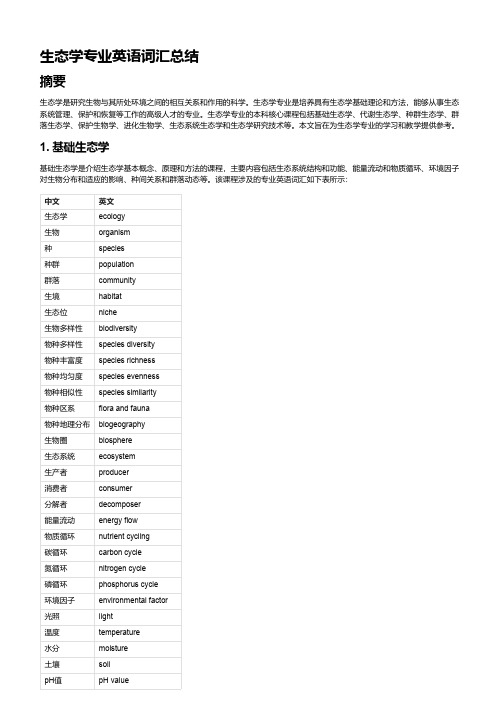
生态学专业英语词汇总结摘要生态学是研究生物与其所处环境之间的相互关系和作用的科学。
生态学专业是培养具有生态学基础理论和方法,能够从事生态系统管理、保护和恢复等工作的高级人才的专业。
生态学专业的本科核心课程包括基础生态学、代谢生态学、种群生态学、群落生态学、保护生物学、进化生物学、生态系统生态学和生态学研究技术等。
本文旨在为生态学专业的学习和教学提供参考。
1. 基础生态学基础生态学是介绍生态学基本概念、原理和方法的课程,主要内容包括生态系统结构和功能、能量流动和物质循环、环境因子对生物分布和适应的影响、种间关系和群落动态等。
该课程涉及的专业英语词汇如下表所示:中文英文生态学ecology生物organism种species种群population群落community生境habitat生态位niche生物多样性biodiversity物种多样性species diversity物种丰富度species richness物种均匀度species evenness物种相似性species similarity物种区系flora and fauna物种地理分布biogeography生物圈biosphere生态系统ecosystem生产者producer消费者consumer分解者decomposer能量流动energy flow物质循环nutrient cycling碳循环carbon cycle氮循环nitrogen cycle磷循环phosphorus cycle环境因子environmental factor光照light温度temperature水分moisture土壤soilpH值pH value盐度salinity适应性adaptation突变mutation自然选择natural selection遗传漂变genetic drift基因流gene flow物种形成speciation物种灭绝extinction种间关系interspecific interaction共生关系symbiosis寄生关系parasitism共利关系mutualism共栖关系commensalism捕食关系predation2. 代谢生态学代谢生态学是研究生物体在不同环境条件下的能量代谢和物质转化过程及其规律的课程,主要内容包括代谢类型、代谢率、代谢平衡、代谢效率、代谢策略等。
fossilization名词解释
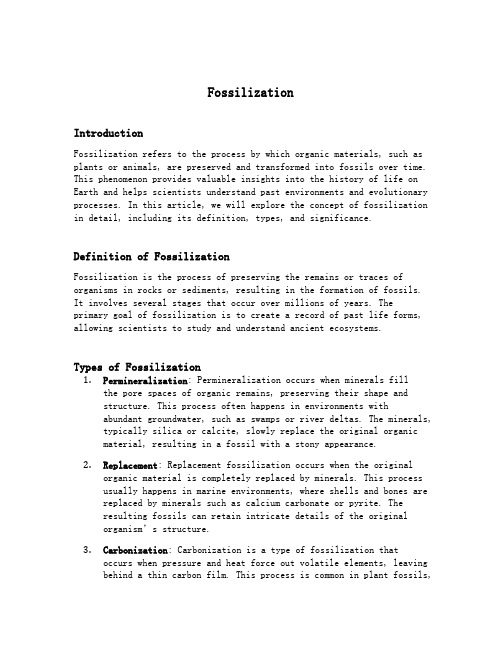
FossilizationIntroductionFossilization refers to the process by which organic materials, such as plants or animals, are preserved and transformed into fossils over time. This phenomenon provides valuable insights into the history of life on Earth and helps scientists understand past environments and evolutionary processes. In this article, we will explore the concept of fossilization in detail, including its definition, types, and significance.Definition of FossilizationFossilization is the process of preserving the remains or traces of organisms in rocks or sediments, resulting in the formation of fossils.It involves several stages that occur over millions of years. Theprimary goal of fossilization is to create a record of past life forms, allowing scientists to study and understand ancient ecosystems.Types of Fossilization1.Permineralization: Permineralization occurs when minerals fillthe pore spaces of organic remains, preserving their shape andstructure. This process often happens in environments withabundant groundwater, such as swamps or river deltas. The minerals, typically silica or calcite, slowly replace the original organicmaterial, resulting in a fossil with a stony appearance.2.Replacement: Replacement fossilization occurs when the originalorganic material is completely replaced by minerals. This processusually happens in marine environments, where shells and bones are replaced by minerals such as calcium carbonate or pyrite. Theresulting fossils can retain intricate details of the originalorganism’s structure.3.Carbonization: Carbonization is a type of fossilization thatoccurs when pressure and heat force out volatile elements, leaving behind a thin carbon film. This process is common in plant fossils,where the carbon film preserves the shape and texture of leaves or stems. Carbonization is often found in sedimentary rocks, such as shale or coal.4.Impression: Impression fossils are formed when an organism’sremains leave an imprint on soft sediments, such as mud or sand.Over time, the sediments harden and preserve the impression of the organism. Footprints, tracks, and leaf imprints are examples ofimpression fossils. These fossils provide valuable informationabout the behavior and movement patterns of ancient organisms. Factors Affecting Fossilization1.Rapid Burial: For fossilization to occur, the remains oforganisms must be rapidly buried by sediments. This preventsdecomposition and protects the remains from scavengers orweathering. Rapid burial can happen through events such asvolcanic eruptions, landslides, or sudden floods.ck of Oxygen: Oxygen accelerates the decay of organic material.Therefore, environments with low oxygen levels, such as swamps or deep-sea sediments, are conducive to fossilization. The absence of oxygen slows down the decomposition process, allowing thepreservation of organic remains.3.Mineral-rich Environment: The presence of minerals, such assilica or calcium carbonate, is essential for fossilization. These minerals infiltrate the organic material and replace it,preserving the original structure. Environments with abundantmineral deposits, such as hot springs or mineral-rich soils,promote fossilization.4.Taphonomic Processes: Taphonomy refers to the various processesthat affect the preservation of organisms after death. Factorssuch as scavenging, decay, or transport can hinder or facilitatefossilization. For example, if an organism is quickly scavenged or decomposed, its chances of becoming a fossil are significantlyreduced.Significance of Fossilization1.Evolutionary Studies: Fossils provide direct evidence of pastlife forms and evolutionary processes. By studying fossils,scientists can reconstruct the evolutionary history of organisms, understand their adaptations, and trace the development of newspecies over time.2.Paleoenvironmental Reconstruction: Fossils also provide insightsinto past environments and climates. By analyzing the fossilassemblages present in a particular rock layer, scientists caninfer the type of environment that existed during the time offossilization. For example, the presence of marine fossils in arock layer indicates that the area was once covered by a sea orocean.3.Dating and Stratigraphy: Fossils play a crucial role in datingrocks and establishing the relative order of geological events. By comparing the fossils found in different rock layers, scientistscan determine their relative ages and create a chronologicalsequence of Earth’s history. This information is essential forunderstanding the timing of major geological events, such as mass extinctions or the formation of mountain ranges.4.Conservation and Education: Fossils are not only scientifictreasures but also important cultural and educational resources.They provide a tangible link to the past and help us appreciatethe diversity of life on Earth. Fossil collections in museums and educational institutions serve as valuable tools for publicoutreach and education, inspiring future generations of scientists and nature enthusiasts.ConclusionFossilization is a complex and fascinating process that allows us to glimpse into the ancient past. By preserving the remains of organisms, fossils provide a wealth of information about past life forms, ecosystems, and geological events. Understanding the types, factors, and significance of fossilization is crucial for unraveling the mysteries of Earth’s history and the evolution of life.。
fossilization 例子
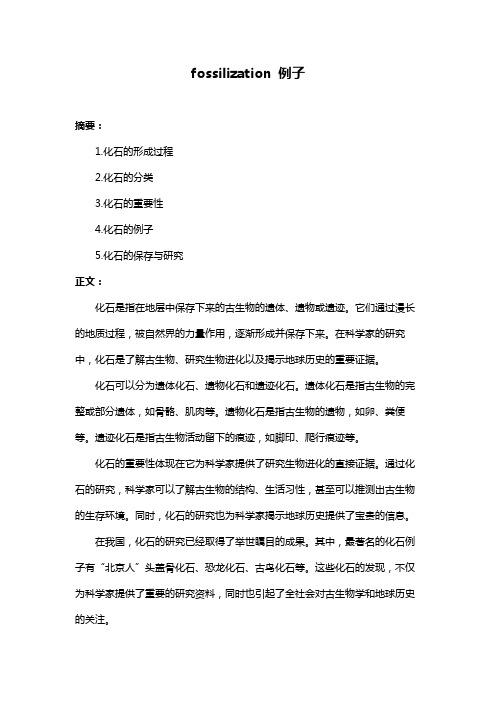
fossilization 例子
摘要:
1.化石的形成过程
2.化石的分类
3.化石的重要性
4.化石的例子
5.化石的保存与研究
正文:
化石是指在地层中保存下来的古生物的遗体、遗物或遗迹。
它们通过漫长的地质过程,被自然界的力量作用,逐渐形成并保存下来。
在科学家的研究中,化石是了解古生物、研究生物进化以及揭示地球历史的重要证据。
化石可以分为遗体化石、遗物化石和遗迹化石。
遗体化石是指古生物的完整或部分遗体,如骨骼、肌肉等。
遗物化石是指古生物的遗物,如卵、粪便等。
遗迹化石是指古生物活动留下的痕迹,如脚印、爬行痕迹等。
化石的重要性体现在它为科学家提供了研究生物进化的直接证据。
通过化石的研究,科学家可以了解古生物的结构、生活习性,甚至可以推测出古生物的生存环境。
同时,化石的研究也为科学家揭示地球历史提供了宝贵的信息。
在我国,化石的研究已经取得了举世瞩目的成果。
其中,最著名的化石例子有“北京人”头盖骨化石、恐龙化石、古鸟化石等。
这些化石的发现,不仅为科学家提供了重要的研究资料,同时也引起了全社会对古生物学和地球历史的关注。
为了保护和研究化石,我国政府和科学家们付出了巨大的努力。
一方面,政府出台了一系列政策,保护和监管化石资源。
另一方面,科学家们通过各种手段,对化石进行详细的研究和分析,以期获得更多有关古生物和地球历史的信息。
总之,化石是研究生物进化和地球历史的重要证据。
它们为我们揭示了古生物的奥秘,帮助我们更好地了解地球的过去。
中介语——精选推荐

中介语⼀、中介语理论的起源20世纪60年代以前,欧美⾏为主义⼼理学和结构主义语⾔学在⼼理学和语⾔学领域占主要地位,在这种理论背景下,语⾔研究领域兴起了对⽐分析理论,对整个外语教学领域有重要的影响。
这种理论认为,外语学习是母语习惯向外语习惯逐步转移的过程。
因此,很多学者和外语教师认为,只要对⽬的语和母语进⾏对⽐,了解母语和⽬的语的异同,就可预测出在⽬的语的学习中会出现什么偏误,⽽且还可以对出现的偏误进⾏分析和解释。
50年代末,⾏为主义⼼理学受到巨⼤冲击,乔姆斯基对语⾔⼼理学的研究是⼈们对外语习得过程中产⽣的偏误有了新的认识。
⼈们发现,外语学习中的偏误并不能完全、准确地⽤对⽐分析的⽅法预测、解释和分析。
后来的许多统计资料也证明了这种猜疑。
这样,以结构主义语⾔学为基础的语⾔对⽐分析受到了⼈们的怀疑。
60年代末,⼀种新的外语学习偏误分析理论产⽣了,这就是中介语理论。
“中介语”⼀词是英国语⾔学家Selinker于1969年在其论⽂“语⾔迁移”(Language Transfer) 中⾸先使⽤。
1972年,他⼜发表的“中介语”(Interlanguage) 的论⽂,对“中介语”这⼀概念进⾏了阐述,确⽴了它在第⼆语⾔习得研究中的地位。
其他研究者们对这⼀概念的描述有许多不同的术语,如W. Nemser (W. Nemser, 1972 ) 称之为“近似语⾔系统”(approximative systems),科德(1967)将它称为“学习者固有的内在的掌握语⾔的课程⼤纲”(learner’s built-in syllabus)、“学习者独有语⾔”(idiosyncratic dialects)、“中继能⼒”(transitional competence)等。
然⽽⼴为⼈知、影响最⼤的还是“中介语”这⼀说法。
⼆、中介语理论的内容中介语(interlanguage)理论是在认知⼼理学的基础发展起来的,它是指由于学习外语的⼈在学习过程中对于⽬的语规律所做出的不正确的归纳和推论⽽产⽣的⼀个语⾔系统。
第六讲interlanguage
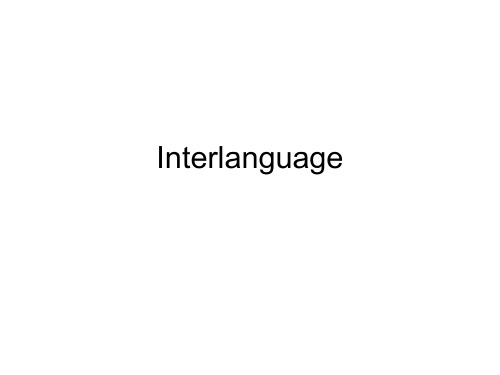
Nature of interlanguage • Few learners progress all the way to native-like proficiency in all areas of the target language, although many learners do become fully functional in all relevant domains of target-language use.
Five central processes of learners’ creating interlanguage
• • • • • Language transfer Transfer of training Strategies of second language learning Strategies of second language communication Overgeneralization of TL linguistic material
Nature of interlanguage • A learner's interlanguage is the learner's system of rules/assumptions/hypotheses about how the target language works. • The learner's interlanguage (i.e., rules/assumptions/hypotheses) changes over time and with increased exposure to the target language. • The learner's interlanguage will contain some rules that are identical to those of a native speaker, but will differ in many or most respects.
- 1、下载文档前请自行甄别文档内容的完整性,平台不提供额外的编辑、内容补充、找答案等附加服务。
- 2、"仅部分预览"的文档,不可在线预览部分如存在完整性等问题,可反馈申请退款(可完整预览的文档不适用该条件!)。
- 3、如文档侵犯您的权益,请联系客服反馈,我们会尽快为您处理(人工客服工作时间:9:00-18:30)。
In addition, some learners' interlanguage stabilizes temporarily while some others’ becomes fossilized permanently. This has been established in many researchers' studies on the development of second language acquisition. In An Integrated Model of Language, Preson(1989)describes stability as a characteristic of the structure of the learner's interlanguage system.
中介语的定义
中介语又称过渡语,即学习者在某一阶段所
建立起来的目标语知酿系统和由此相互连接 而引起的一种连续体。 Selinker早在1969年在剑桥国际会议上就提 出了这一术语,并在1972年正式发表论文对 其进行全面阐述,In his interlanguage , Selinker introduced the concept of fossilization. 从此就确立了其在第二语言习得理论中的主 要地位。
2. The definition of stabilization
Stabilization comes from the verb "stabilize", which means "to (cause to) become firm, steady, or unchanging”. In second language acquisition, stabilization refers to the steady State in which there is no change occurring.
4. Stabilization and fossilization in language acquisition
Like all natural languages, interlanguage is variable. Theoretically, interlanguage variability is systematic along a developmental path, towards the target language. In fact, the availability of the target language model is often denied, and the degrees of the learners' interlanguage variability are consequently different due to a number of factors. A case in point is that some learners' interlanguage stabilizes earlier than the others'.
As Selinker says, stabilization is a temporary stage of "getting stuck", a natural stage in learning process. From that, we learn that stabilization is a language-acquisition stop at the moment, or for quite a long time. But it can be changed after being given certain conditions.
3. The distinction between fossilization and stabilization, and their relationship From the definitions above, we can conclude that fossilization refers to permanent retention of non-native interlanguage forms, while stabilization refers to the case in which nonnative linguistic items are not permanent, but may "destabilize" or change into the authentic target language norms.
It is apparent that stabilization is correctable, while fossilization is not ;stabilization is a temporary stop but fossilization is a permanent stop; and stabilization is a kind of learning state while fossilization is a kind of learning result. For example, in the formal second language learning situation, a learner may stick to a linguistic error for his whole school age. But after he comes to the natural acquisition situation, with his adequate exposure to the target language, the error may disappear. In this case, the error can only be seen as a stale system is one where there is an absence of variation because no new forms are entering the system and existing forms have become categorical. When this kind of stability is found, fossilization may occur. Drawing on Gatbonton's(1978) ideas of "diffusion model", Ellis suggests, in his formfunction networks (p366), that second language acquisition involves a first stage (the "acquisition phase"), where new forms are acquired and used in free variation, and subsequent stage (the"reorganization phase") where learners sort these forms into functional pigeon-holes.
语言石化的定义
语言的石化现象又叫语言的僵化现象,是指
语言学习者在外语或第二语言的学习过程中, 语言能力的培养一旦达到高峰期后,就会停 滞不前,且经常有退步的趋势, 这种现象就 是语言的石化现象。根据这一概念,我们可 以看出语言石化现象研究的对象是过渡语 (又叫中介语)。
(Routledge 语言学与应用语言学词典》把石 化解释成“习惯的永久保持”,而且强调, “虽然有最佳的教学要素和正确的反馈,石 化也会发生”。 (Bussman,1996) 石化的形成是二语学习中出现的一个过程。 在此过程中,语言学习者的二语或外语的异 常语言形式逐渐稳定下来,成为不可改变的 部分。这一过程是:出现错误一反复出现一 稳定一不可改变(石化)。在此过程中,一部分 错误会被改正,另一部分没能改正而石化。 这里就涉及到 fossilization 和 stabilization( 稳 定)的区别。
Fossilization vs. Stabilization
语言石化现象及其稳定性
Contents
1.Defination
of fossilization 2.Defination of stabilization 3.The distinction between fossilization and stabilization, and their relationship 4. Stabilization and fossilization in language acquisition
So after Selinker, Rod Ellis gave us the definition of fossilization: the persistence of a non-standard form in interlanguage. Of course, we know that the term ``fossilization" derives literally from "fossil" which refers to a kind of stone turned Cram a buried piece of soft wood because of the steady drip of calcium-containing water. By fossilization in language acquisition is meant the rigidity of mind and habit induced by the steady drip of wrong and harmful methods in learners.
